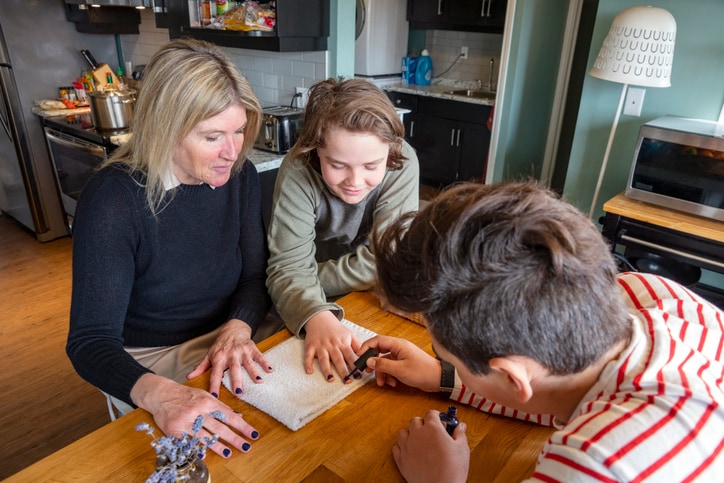When it comes to reading, parents, caregivers and experts agree that an early introduction to books and language is essential to their development. This advice, unsolicited or not, is accurate, but it can also be confusing or overwhelming. Babies don’t read and toddlers sometimes struggle to sit long enough for a picture book. However, when you read to a child, you’re starting the journey to raise a reader and book lover.
“The literacy journey begins from day one,” says Harrison Alley, owner of FictionLit.com, a platform dedicated to promoting a love for reading and literature. “Reading aloud to infants and exposing them to books from a young age establishes a foundation for literacy development.” says.
As children grow, reading evolves into a more independent and interactive experience, but one you can continue to support and nurture. Here, experts and experienced parents share their best tips and tricks for raising a reader.
What is a reader anyway?
In order to raise a reader, it can help to define what exactly it means to be one..
“[A reader is] a child who finds time every day to curl up with a favorite book and get lost in it,” says Jessica Quinn, mom to 11-year-old Dexter. A reader will gravitate to books and choose them over all other options, she says.
Kim Bongiorno, a writer and parent to teenagers who love books, says someone is a reader if they are drawn to taking in written stories in any way. “There is a curiosity for more — information, escape, entertainment —and an understanding of what they are interested in consuming,” she says.
A reader may also be someone looking for creativity and escape. “A reader is a person who loves words and the ways they can go together to create new concepts and worlds,” says Norline Wild, an assistant professor of early childhood education at Niagara University who holds her doctorate in philosophy and masters in social work.
Readers may also center it as a pastime. “To me, a reader is a person who is comfortable reading, looks forward to it and associates good feelings with reading,” says Ashley Wright a homeschool mom of two children who holds her masters in education.
Reading with your eyes and listening to an audiobook activate the same part of the brain, adds Wright. That said, consuming e-books, audiobooks or print books are all valid ways to become a reader.

Find child care near you
Find child care in your area
Why it’s important to raise a reader
Books are a valuable learning tool that can broaden a person’s horizons. They teach us practical skills and strengthen our compassion and empathy. “Stories are an integral part of human culture, so being able to read can make it easier to experience more stories,” says Wright. Several more reasons why raising a reader is crucial for intellectual and emotional growth:.
Thinking skills and academic success
Reading enhances cognitive development, including critical thinking and language skills, says Alley. He adds that strong literacy skills are closely tied to academic success across various subjects and disciplines.
Diverse representation and perspectives
For Quinn and her son, both who are autistic and have ADHD, she says raising a reader bolsters the ability to see different interpretations and perspectives. “Interpersonal communication is socially learned, and many neurodivergents need some support in that area,” says Quinn. “Reading can really improve [our] ability to see [ourselves] as a character in a book and see the world from that perspective instead of being frozen in our own minds.” This fosters an ability to communicate with others and understand where they’re coming from, she says.
Bongiorno echoes this sentiment, adding that getting in the habit of seeking stories for different purposes helps kids navigate their interior world and the one around them.
The world makes a little more sense when kids see themselves and others with differences represented in the books they read. Reading fosters empathy and understanding by exposing children to diverse perspectives and experiences, points out Alley.
Practical life skills
Raising a reader also builds practical skills that a child can use for life. A few examples, according to Wild:
- The ability to understand and question history
- The ability to be a critical consumer of current events
- Creativity
- Strengthened connection to friends, family, and community
- An opportunity to escape and relax
“Start reading with children before they are born. The soothing voice of caregivers heard in the womb can set the stage for a love of reading.”
—Norline Wild, assistant professor of early childhood education at Niagara University
Expert tips for raising a reader
Cultivating a love of books and reading doesn’t need to happen overnight. Start early and play the long game when it comes to raising a reader. Here’s how, according to parents and experts we spoke to who also considered the individual abilities and resources a child and family may have.
Begin reading as soon as possible
“Start reading with children before they are born,” recommends Wild. “The soothing voice of caregivers heard in the womb can set the stage for a love of reading.”
Very small children and babies may not understand you, but they can still benefit from hearing complex stories, notes Wright. “Reading more advanced works to your small children causes their vocabulary to expand exponentially,” she explains.
Read together
Reading to infants and toddlers is an opportunity to bond, and it creates a deep relationship with each other and books, says Wild. You are creating positive memories that involve stories.
“Whether it be bedtime stories, novels we read together for fun, excerpts from whatever I was reading in order to spark conversation or to share what just made me laugh out loud, I’ve read to my kids since they were infants and never stopped,” says Bongiorno whose kids are now in high school and college.
Lead by example
To raise a reader, you’ll do best to model being a reader yourself. “Children often emulate the behavior of their parents,” says Alley. “Demonstrate a love for reading by incorporating it into your daily routine. Let your child see you reading books, newspapers or magazines to emphasize the importance of literacy in daily life.”
Visit the library
Quinn says her biggest contribution to encouraging and supporting her son’s reading was a library card. For a kid who can read a chapter book in two days, visiting the library makes it affordable and possible to support her son’s love of books.
Librarians are also great at helping you find books that are age-appropriate and can suggest books based on your child’s interest. You might also attend storytimes and author meet and greets at libraries, which can spark a kid’s love of reading.
Supplement their interest
Bongiorno helped her kids find books they would like based on their hobbies and interests. She suggests asking the following questions when thinking about what books your kid may enjoy:
- What games do they play?
- What activities are they into?
- What TV shows or movies do they like?
- Who are the people they look up to?
Then, ask a librarian or a bookseller or Google what books would be good for a child’s age that feature stories that include those interests or identities, suggests Bongiorno. If your kid wants to read about Minecraft, let them in order to encourage reading overall.
“Reading can really improve [our] ability to see [ourselves] as a character in a book and see the world from that perspective instead of being frozen in our own minds.”
—Jessica Quinn, mom to 11-year-old Dexter
Try audiobooks
“Audiobooks can be great for introducing a child to a love for stories, because they bypass any difficulties a child may have with reading with their eyes,” says Wright.. They’re also great for car trips, even for kids who are equally happy with a digital or print book.
Provide variety and let them lead
Expose your kids to different genres and types of books to see what sticks. Wright recommends buying or borrowing the following types of books in order to have them available to your kids:
- Picture books
- Early readers
- Comic books and graphic novels
- How-to books
- Novels or chapter books
- Nonfiction books
- Coffee table books
- Books without any words and just pictures
When trying to find a book your kid likes, Bongiorno says to think bigger. “Think of it as fostering an excitement for stories (fiction) and information (non-fiction) rather than books,” she advises. “This means rereading old favorites you might think they’re too old for now, picking graphic novels and comic books, diving into topics and tales you are not interested in or familiar with.”
You’ll also do well to let kids read whatever they want however they prefer, whether it be print, digital or audiobooks.
Giving kids autonomy over their reading choices will keep them choosing books, points out Bongiorno.
Have your child evaluated by a professional
It’s important to validate a child’s experience if they are struggling to read or aren’t interested, point out Wild.
At the same time, if your child is reluctant or struggling to read, consider having them see an eye doctor who can run tests for dyslexia, eye tracking or convergence issues, suggests Wright who also recommends looking into phonics programs.
Resources for raising a reader
If you’re looking for resources to foster a child’s interest and skill development in reading, the good news is that there are many excellent options. He suggests the following service platforms that offer a variety of topics and age-appropriate options:
- Audible for audiobooks
- Epic! or ReadingIQ for digital books
- Libby for audio and digital books offered through your local library
Consider tapping your local library for additional resources for young readers, advises Wright. Between the free activities and books to borrow, some libraries have rewards for reading logs and programs that allow kids to read to a dog or stuffed animal.
And don’t hesitate to speak to your child’s teacher, as they can also be a great resource to help you find the support you need to help your child develop their reading skills.
The bottom line on raising a reader
Raising a reader means raising a child who develops critical thinking skills and an appreciation of other people and places. Your willingness to read to your child and providing them with books are the first steps. “Books are incredibly powerful,” notes Wild. “Explore them with children. Give them space to make observations and ask questions. Let them touch the book and turn the pages. Choose books that are fun and playful and also that broaden our understanding and appreciation of all people.”
Your journey can start at the library, but with some exploration and practice, your child’s love of reading and literacy will never end.






